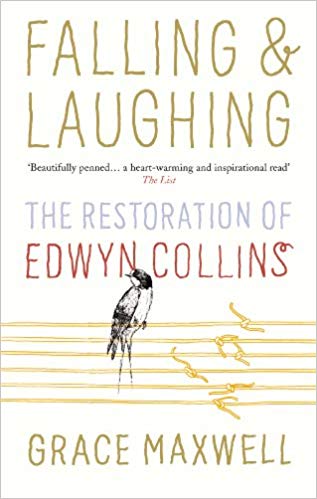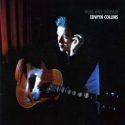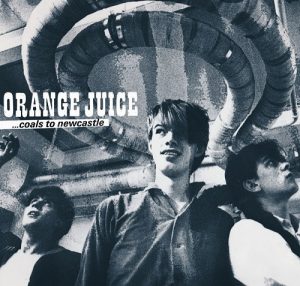Edwyn Collins
| Track | Album |
|---|---|
| The Wheels Of Love | Hope And Despair |
| Hope And Despair | Hope And Despair |
| A Girl Like You | Gorgeous George |
| Low Expectations | Gorgeous George |
| Never Felt Like this | Doctor Syntax |
| Splitting Up | Doctor Syntax |
| Home Again | Home Again |
| Leviathan | Home Again |
| Losing Sleep | Losing Sleep |
| 31 Years | Understated |

Edwyn Collins
Contributor: Andrew Shields
The idea of the ‘triumph over adversity’ has become a cliché of modern music documentaries. Indeed, it is often used in cases where the ‘adversity’ involved was either comparatively minor or relatively trivial. In relation to Edwyn Collins’ life and musical career since he suffered two severe brain haemorrhages in 2005, however, this sometimes hackneyed phrase has real meaning. For those interested in the extraordinary story of his gradual rehabilitation from that near fatal medical emergency, the superb book, “Falling & Laughing: The Restoration Of Edwyn Collins” by his wife, Grace Maxwell, is very highly recommended.
There are also two fine documentaries about Collins’ life since then which are also well worth watching – the first a relatively straightforward BBC account and the second, the far more experimental film, The Possibilities Are Endless. Here’s the trailer:
As all of these sources show, the fact that Collins eventually returned to making music is something of a miracle. Indeed, it is a testament to his own reserves of courage and resilience and to the support he has received from his family, friends and the medical profession.
During this process, Collins had not only to rebuild his physical health but also to re-learn many things he had previously taken for granted. A master of words (one of the great lyricists to emerge after the revolution caused by punk) he had to begin again with them more or less from scratch. His efforts to do so are very well chronicled in the accounts which are listed above. In the long term, his determination to reclaim as much as he possibly could of his past life has proved remarkably successful.
In discussing his solo career, it might be best to go back to the beginning (a very good place to start). In a previous Toppermost, I discussed Edwyn’s time with the highly influential Scottish group, Orange Juice. By the time of their last album (The Orange Juice released in 1984), the group had dwindled down to just two members – Collins himself and the drummer, Zeke Manyika. In consequence, it had become very clear that the band’s days were numbered. The consistent excellence of Collins’ songs on that album meant though that he appeared to be very well set up to pursue a successful solo career when the group split up soon after its release.
His first solo album, Hope And Despair, first released in 1989, was a remarkably accomplished one. It was made with a small group of trusted friends and collaborators, who included Dennis Bovell (he had produced the final two Orange Juice albums) on bass and Roddy Frame (who had been a label-mate of Edwyn’s on Postcard Records with his band, Aztec Camera) on guitar. It was, perhaps, this fact which accounted for the generally laid-back and mellow feel of the record. Like all of Collins’ work – going back to his time with Orange Juice – it also reflected his wide-ranging musical influences. These included soul (especially on Pushing It To The Back Of My Mind, Ghost Of A Chance and The Measure Of A Man) and 1960s pop, country-rock and folk-rock (as on Let Me Put My Arms Around You and The Wide Eyed Child In Me). My first selection, The Wheels Of Love, also shows something of the latter influence, with its clear debt to Gordon Lightfoot’s classic, Cotton Jenny. It also features one of Collins’ finest lyrics with some brilliant internal rhymes, as in its opening line:
Tom was a lush with a crush on a girl named Rene
And the similarly clever opening line of the second verse –
Tom took a drive to the dive where he drank every day
Like a John Prine number, the song’s slightly sardonic lyric only partially disguises a keen empathy for its subjects. It is also a very well crafted pop song which Collins sings superbly. Indeed, throughout the album, his singing shows a new-found control and self-confidence, which he did not quite possess in the early days of Orange Juice
My other selection, Hope And Despair, may, perhaps, reflect some of Collins’ disillusionment with the music business following the break-up of Orange Juice. It includes a finely judged satirical portrait of another contemporary musician (a wandering minstrel/ in a badly cut suit/ resplendent with afro/ and electric lute) who is selling a false message of despair while he plays through a fuzzbox to an audience of one. In Collins’ view, as put forward in interviews at the time, this type of ‘doomy’ and nihilistic message was the antithesis of the genuinely subversive potential and broadly optimistic message which he believed had underlain punk music.
While Collins’ next album, Hellbent On Compromise, was a fine, if rather a low key one, it was his third solo record, the classic Gorgeous George released in 1994 that marked the real commercial breakthrough in his solo career. The album’s success owed a great deal to the fact that the first single from it, A Girl Like You, was the most gloriously catchy pop song of his solo career. It was both a superb pop song and, by Edwyn’s own admission, his attempt at writing an Iggy Pop style song. It also features some excellent guitar playing by Collins himself, as can be seen in this great live version:
The observant of you will notice Paul Cook of the Sex Pistols – who has played with Edwyn on and off since that time – on the drums.
As a contrast, my other choice from Gorgeous George, Low Expectations, is an entirely different type of song. It has a gentle laid-back feel reminiscent of some of the late-60s folk rock songwriters. At the same time, the lyric has an acerbic and disillusioned air to it which goes against the grain of its rather dreamy melody.
More broadly speaking, all of the songs on the album are excellent ones and it was very difficult to decide which ones to exclude from this list. In the end, my choice was based on selecting those tracks which gave a good representation of the qualities of the record as a whole.
Edwyn Collins’ next album, I’m Not Following You, was another fine if slightly patchy one. Among the highlights on it were the disco-influenced Seventies Night (which featured a guest vocal from the late great Mark E. Smith and can be heard here) and his tribute to the Northern Soul clubs, Keep On Burning. In my opinion, however, his follow-up album to it, Doctor Syntax, is one of the finest and most underrated achievements of his solo career. In it, he attempted a highly original synthesis between synth pop (as it could be described), slick soul (especially of the Philadelphia variety) and the kind of rock (the shadow of The Beatles hangs over a few of the tracks on the album, if in ambivalent ways), folk-rock and country-rock influences which had epitomised his earlier career.
There is a unity of mood and vision to the album which made it quite difficult to select individual tracks from it. In the end, I went first for the excellent soul-pop song, Never Felt Like This. It is one of the few songs I know to both betray a clear Stylistics influence while also including a quick nod to the Velvet Underground. Tim DiGravina of AllMusic has described my next selection, Splitting Up, as perhaps “the most beautiful song Collins has ever recorded” and I would not disagree with that judgement. Its lyric is extremely witty while it also clearly reflects Collins’ own uncertainties about where his musical career was heading.
It was during the recording of Collins next album, Home Again, in February 2005 that disaster struck. It was close to completion when he suffered a cerebral haemorrhage. A few days afterwards, he suffered a second one, which was almost equally severe. Indeed, for some time after that, it was very much touch and go as to whether he would survive or not. As well as this, there was considerable concern as to what his mental and physical state would be even if he did survive that immediate danger. In those circumstances, it proved something of a miracle that he was able to return and oversee the final re-mixing of the record with his friend, Sebastian Lewsley, in 2007.
In the event, the album was an excellent one and features some of Edwyn’s most emotionally affecting and deeply personal songwriting. Grace Maxwell, his wife, has suggested that my first selection, the title track Home Again, indicates that Edwyn must have had “second sight”. It was written before his strokes but several of the lines in it (such as the claim that music was his “unholy salvation”) seem, in retrospect to be directly applicable to his situation afterwards. It also features one of the finest melodies that Collins had written in his entire career.
My other pick from the album, Leviathan, also has a beautifully crafted lyric. It describes in a strikingly poetic way the famous steps (the Whaligoe Steps – “a step for each day of the year”) which lead down to the small port of Whaligoe near the town of Helmsdale, where Collins’ grandparents lived.
There is a tension in the song between the beauty of the place and the sense of apprehension and foreboding which the singer feels (for the sea was bewitched and defiled/ and the sea was black and swollen/ and the sky was red and molten). Collins has admitted to having a similar sense of dread in the period immediately before his two strokes and the song may reflect this. In a slightly curious twist, Edwyn and Grace have recently returned to live in his grandparents’ house there. One of the key stages in his rehabilitation was making the long and steep descent on the steps described in the song.
My last two choices, Losing Sleep and 31 Years, come from the two excellent albums Edwyn has made in the years since those near-fatal medical events. Both deal frankly and in a very open way with the challenges which he has faced in that time. However, they also display the positivity which has been a key element in his music since his very first days on Postcard Records.
To conclude, in January 2014 I had the privilege of seeing Edwyn Collins play live here in Sydney. It ranks very high among the best concerts I have ever seen. There was an extraordinary atmosphere which reflected both the audience’s admiration for his music and their respect for his courage and resilience. The show also reflected Collins’ remarkable ability to develop an immediate and seemingly intimate connection with everybody there. What ensued was an evening of superb music and quick wit, a life-affirming live performance. To quote Paul Morley on an earlier Collins’ gig, the show “was not a painful, disconcerting exercise in sentimentality, or something even odder and sadder, but a buoyant and inspiring performance that never once suffered from a failure of nerve or a loss of concentration. You can’t avoid the reality of Collins’ condition, but it doesn’t get in the way of what he really wants us to think about. His songs.”
And to top it all off, he played both Felicity and Blue Boy.
What more could one ask for?

“Falling & Laughing: The Restoration Of Edwyn Collins” by Grace Maxwell (Ebury Press 2010)
Coals To Newcastle – Box Set (everything Orange Juice recorded)
New album from Edwyn Collins, Badbea, March 2019
Postscript (July 2019): Had to let Badbea settle in for a while but it is already one of my albums of the year. And – as of now – my favourite tracks are the title track and “Beauty’. Yet another classic album from this great songwriter. (AS)
Edwyn Collins official website
“Simply Thrilled: The Preposterous Story Of Postcard Records” by Simon Goddard (Ebury Press 2016)
Edwyn Collins biography (iTunes)
Andrew Shields is a freelance historian, who grew up in the West of Ireland and currently lives in Sydney, Australia. Along with an interest in history, politics and literature, his other principal occupations are listening to and reading about the music of Bob Dylan and, in more recent years, immersing himself in the often brilliant and unduly neglected music of Phil Ochs ….
TopperPost #768















‘Girl like you’ is one of my all time favourite singles. That guitar fill in the verse. I’m still trying to work out just what he used. Looking at that live version it’s either a ring modulator ornam envelope filter run through a distortion or fuzz pedal. But it’s a really nicely done guitar part without the effects too.
David, thanks for this. And, yes, ‘Girl Like You’ is such a brilliant single. Am afraid I can’t help you with guitar part – I thought ‘a ring modulator ornam envelope filter’ was something from Back To The Future – or was that a ‘flux capacitor’?
Should add that there is a discussion about this point here.
And now I know where John Martyn got the title for this song from.
Thank for that. A Fuzz! and an envelope filter. Into a flux capacitor, which has had its polarity reversed.
A nice Topper, Andrew. I knew little about Edwyn apart from the ubiquitous “Girl Like You” but he’s quite an artist and you did him the honour of an excellent essay.
Dave, thanks for the kind words. And am now very much looking forward to the arrival of Badbea which I ordered just the other day – another chapter in the Edwyn story.
Andrew – I’ve belatedly stumbled on your essays about Orange Juice and Edwyn. Thank you for them both. It’s a long career, many ups and downs, but you capture in a succinct and thoughtful way pretty much what it was all about. I really enjoyed reading them both. In the future, when I get asked for biographical material, (my heart sinks) may I use these words? You do much better justice than I could.
very best
Grace
Grace, thanks for the very kind words. Very happy for you to use these pieces in any way that you wish. Should add how much I enjoyed your book which I bought from your stall outside that brilliant gig in Sydney which I mention above. Edwyn’s music is a gift to which I constantly return – thanks again.